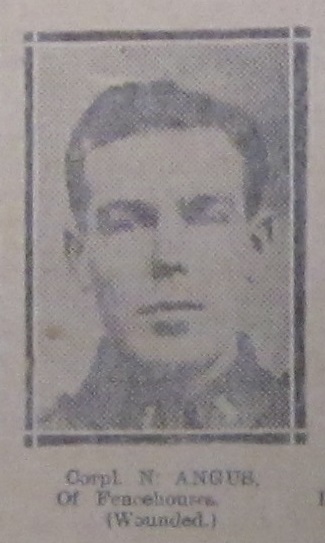
Norman Angus was born at Southwick, Co. Durham in 1890. He was working as a miner prior to enlisting in September 1914. He was posted to the 8th Battalion of the Yorkshire Regiment.
He would have been sent to France in September 1915 and he had a somewhat chequered career. He had been promoted to Corporal by early 1916 but was reduced to Private. He was wounded in December 1915 and again in September 1916 and unfortunately had to forfeit 6 days pay for unauthorised absence in 1917.
14043 Corporal Angus was awarded the 1915 Star, the British War Medal and the Victory Medal.
He died aged 84 in March 1975.
Explore more memories from the ribbon
-
Alfred W Salmon
Alfred was born around June 1882 at Thornaby near Stockton, the son of Thomas Salmon, a foreman brewer. Alfred would eventually become an assistant grocer at Leyburn. Here he courted Lizzie Chiltern. Lizzie’s brother James had joined the West Yorkshire Regiment and was killed in June 1917 aged 20. It would appear that they never married as Alfred’s attestation form, when he signed up, has him as unmarried. The 1911 census has Alfred living in Leyburn as a boarder to a widow Catherine Pearson, aged 70. He enlisted on the 8th April 1916 at Leyburn joining the 5th Battalion Yorkshire Regiment. By early 1917 Alfred had been wounded and was to spend the rest of 1917 and part of 1918 convalescing in England. He was discharged from the Army on the 15th April 1918, his rank being Lance Corporal. Alfred was now living in Waverley Terrace, Darlington. It was here that he died from pneumonia, exacerbated by his war wounds on the 16th February 1919 aged 36. Alfred was buried in Darlington West Cemetery.
-
Henry Robinson
Kevin Robinson of Dalton on Tees visited the Green Howards museum to tell us about his great great grandfather, Sergeant Henry Robinson MM. Henry joined the Yorkshire Regiment (the Green Howards) as a very young man and soon left the UK to serve in the Boer War. Henry had several service numbers during his career with the earliest (and therefore a low number) being 421. On returning from the Boer war he then went to serve in the First World War both in France and Belgium, Henry and his division engaged in 2nd & 3rd Battle of Ypres, 1st & 2nd Battle of the Somme and the Battle of Arras to name a few. He is believed to have been a very accomplished horseman. His army career spanned some 4 decades as a Territorial reservist. During this time he picked up a proud chest-full of medals including the Military Medal awarded 10th October 1916. Adding a Bar to his MM in October 1918, other medals believed to be Queens South Africa Medal, 1914 Star, British War Medal, and Victory Medal with Oak Leaf (Mentioned in Despatches). Henry was also a Hero when not serving his country he was serving children with fun, Henry and his wife Elvira lived in a motor home at Derby Street / Cooper Street / Canon Street Common in Middlesbrough. They operated several fun fair rides which included swing boats and a roundabout. They continued to run the fun fair rides for several decades into the…
-
John C Morris
John Charles Morris was from South Hetton. He was born in 1896 and was 18 when he enlisted in the Yorkshire Regiment as 14136 Private Morris. He served in the 8th, 9th and 10th Battalions and was awarded the 1915 Star, the British War Medal and the Victory Medal, as well as the Silver War Badge. He was wounded in December 1915 and again in November 1916. He suffered a gun shot wound to his left hand and lost part of a finger and substantial power and movement in his right hand. He also suffered a shrapnel wound to his left foot. These injuries precluded manual work due to a lack of power in his hands. After his discharge in December 1918 he was awarded a pension of 8 shillings a week and was subject to regular reassessments of his injuries. He died aged 61 in 1957.
